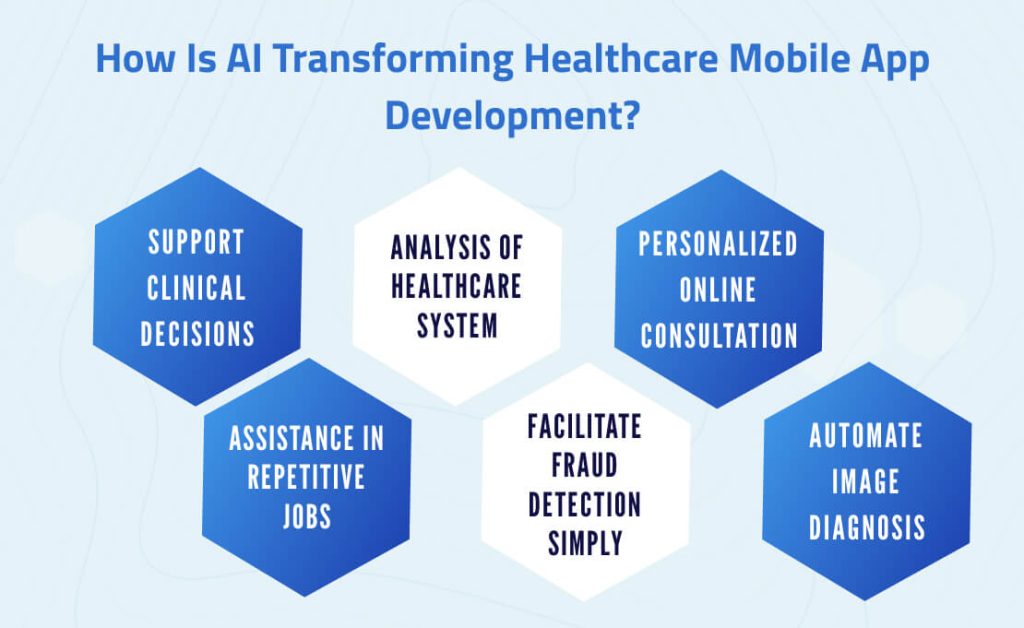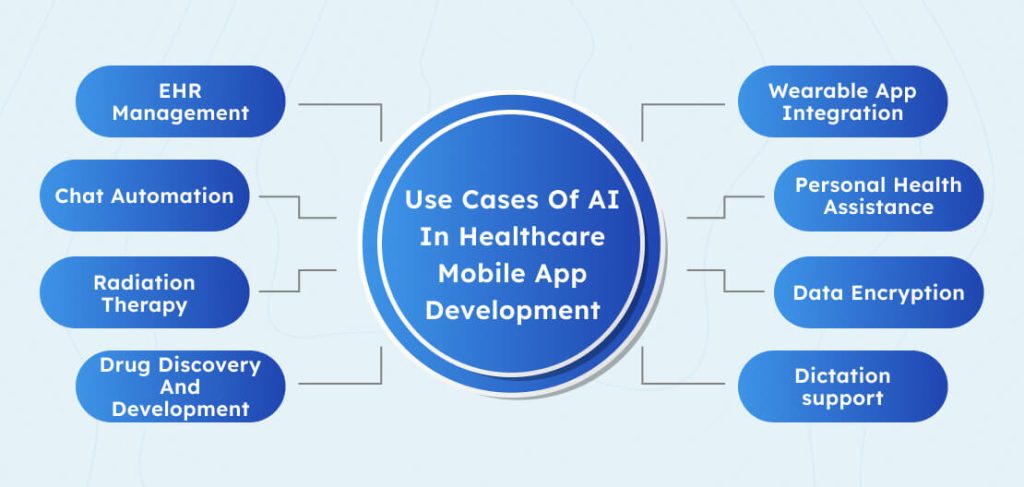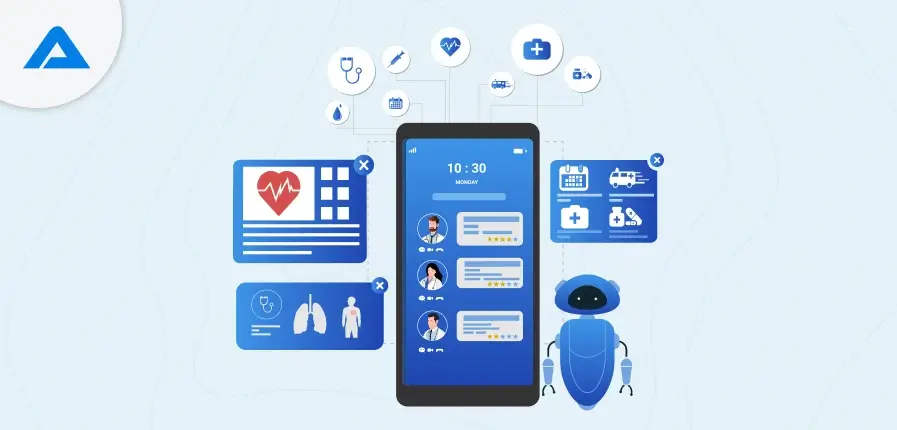The ever-changing and complex healthcare market saw changes in paradigms. The emergence of new technologies such as AI and ML could be catalysts for this change. Today’s healthcare services are available through our phones, thus becoming part of our everyday routines. Artificial intelligence, or AI, is a subset of computer programs designed to behave and think like humans. It is true that AI is a method of studying how our brains work, think, solve issues, and make choices.
Artificial intelligence is a ubiquitous technology in the modern technology-driven business world. It is currently becoming a reality in healthcare. According to studies, the widespread use of AI within the healthcare development services will be around US$17.95 billion by 2030. 187.95 billion in 2030. This figure clearly illustrates the power of technology in developing mobile healthcare apps.
Healthcare organizations must research and use new technology to remain at the forefront of innovation and provide patients with higher-quality care.
In this article, we will examine AI in healthcare mobile apps.
Understanding AI In Healthcare Development Services
Healthcare mobile application development is experiencing revolutionary change due to the powerful synergy between AI and mobile technologies. Artificial intelligence can immensely affect healthcare in all forms – from diagnosis and treatment to patient involvement. AI in healthcare refers to using machine learning techniques such as natural language processing and deep learning with patients to maximize experiences while supporting healthcare providers as they treat them. AI’s predictive and data processing capabilities allow health professionals to manage their resources more effectively and to adopt a more proactive approach to the various aspects of healthcare.
By using these tools, doctors can make faster and more precise diagnoses. At the same time, health professionals can quickly identify electronic health records, and patients receive appropriate and timely medical treatments. AI lightens the load on health experts if used as part of healthcare solutions. AI can be used to automate administrative processes like making appointments and handling claim forms. This allows medical professionals and nurses to focus only on what matters to their clients.
How Is AI Transforming Healthcare Mobile App Development?

Artificial intelligence development in healthcare app creation has successfully transformed doctors’ and patients’ journeys. After the COVID timeframe, in which the pandemic required rapid changes, AI-powered applications have transformed the world of healthcare. We will examine how using AI for healthcare apps has changed the health industry.
Support Clinical Decisions
AI assists in diagnosing, planning treatments, and population health management. It helps clinics make decision-making-driven decisions in radiology and Ophthalmology. AI-based clinical judgment enhances the chance of recovery from a health issue by anticipating the result of medical treatment.
Furthermore, with the help of biomedical image data, AI assesses the risk of specific ailments and recommends crucial precautions. Healthcare apps developed with AI provide the most appropriate plan to take action for particular medical conditions to ensure they are treated appropriately.
Analysis Of Healthcare System
As AI technology advances and application development in health, it is now easy to access data associated with physicians, treatments, medical histories, and other medical records. Physicians can track patients’ medical conditions and use data mining techniques to reduce unnecessary hospitalizations and errors during ongoing care. Apps improve the healthcare system by identifying illnesses early and enhancing the efficiency of health management systems.
Personalized Online Consultation
The health care IT solutions developed using AI give a personalized online consult user experience based on the individual’s medical background. The application ensures that patients only have to send in their symptoms and then begin to check for diseases incorporated into their database.
In light of the illness that has been diagnosed and the patient’s medical condition, the best procedure that the patient is advised to follow will be recommended. In addition, the mHealth app’s users can generate reports and talk to an appropriate medical professional to get further help.
Assistance In Repetitive Jobs
The healthcare industry is pushing toward cognitive assistants that can analyze and reason with deep medical expertise. Some apps help collect patients’ data via EHR. They eliminate redundancy in identical tasks to find patient data, analyze multiple data sources, and gather patient data faster.
Facilitate Fraud Detection simply.
These apps, which AI powers, can detect false data claims. The app keeps track of fraud data and informs clients early enough before they receive their money. It also protects against cybercrime or the taking of personal information.
Automate Image Diagnosis
AI has the capability of computer vision that assists in recognizing abnormalities within various medical images. It includes radiology and CT. Image recognition tools assist doctors in analyzing situations such as liver inflammation, tumors, and cancer prognosis.
For example, AI-powered visual inspection can diagnose children’s biopsy pictures. The system uses ML algorithms to differentiate between celiac disease and environmental enteropathy, as a professional and experienced doctor can diagnose.
Use Cases Of AI In Healthcare Mobile App Development

There is enough discussion about the impact of AI-powered apps and custom healthcare software development within the healthcare field. Look at the most popular AI uses to build AI-powered mobile healthcare apps.
EHR Management
Electronic Health Records (EHR) are the best option for integrating data within digital health. The EHR aids healthcare providers in effectively storing and retrieving patients’ data. AI-powered EHRs permit doctors to gain access to learning resources that can be used for investigations, perform exact diagnosis, send appointment reminders, and so on. The EHR is also beneficial to patients by providing refills for prescriptions and immunizations, scheduling appointments at their homes, and remote diagnosis, for example.
Chat Automation
The competition between a broad range of mobile applications gets more intense daily. It has created a tremendous desire for an omni-channel user experience and 24×7 assistance systems for customers. Hiring two or three support managers can be costly, mainly when questions aren’t difficult to solve.
The idea is an AI-driven chat automation system available 24 hours a day to respond to users’ inquiries and aid them in finding solutions in a matter of minutes. Chat automation uses NLP to understand customer questions and allow communication with customers more effectively and in a context. This streamlines the customer support process and decreases labour-intensive tasks.
Radiation Therapy
Healthcare apps can collect patients’ medical records electronically (EHR) to improve cancer treatments with radiation. AI recognizes old medical records, allowing healthcare providers to make informed decisions about radiation dosage while protecting healthy cells and increasing the treatment’s efficacy and safety.
Drug Discovery And Development
Artificial intelligence accelerates the process of developing and discovering drugs in pharmaceuticals. The biological data gathered by machine learning models is studied to determine possible drug candidates, significantly reducing the time needed to conduct studies. Innovative designs for drug molecules featuring specific therapeutic properties made with AI will transform the pharmaceutical development process.
Wearable App Integration
Fitness and wearable apps are generating buzz in medicine. They make tracking patients’ sleep patterns, heartbeats or pulse rates, and other biomarkers easier. The integration of AI applications for healthcare into wearable devices allows for continuous monitoring of chronic diseases.
Wearable apps employ a deep learning algorithm to guarantee minimal risk and rapid recognition through self-learning modules. In simple terms, wearable applications can change how we think about the health sector. It is already setting an example of technological advancement.
Personal Health Assistance
AI applications for healthcare use speech recognition technology and virtual assistants to create seamless communication between the user and the doctor. The virtual assistant provides personalized help to the user regarding the medical needs of patients. Customers can receive immediate answers to health-related questions whenever they want them. The company caters to every customer to the highest degree of personalization.
Data Encryption
Healthcare service providers and hospitals are awash with sensitive data, which requires high security. Custom healthcare software development and apps provide end-to-end encryption of data to protect it from hacking. It’s often difficult for hospital security personnel to observe and identify every possibility of loss. AI helps with security measures and reduces the chance of data theft by providing solid data security.
Dictation support
Health professionals constantly review various documents to ensure they notice all vital information when diagnosing. Every little detail can be detrimental to the patient and medical professional. Natural Language Processing, or NLP, helps eliminate irrelevant information from lengthy documents and only stores the essential data on authorized mobile phones. It is also available for medical professionals to use in the background or when they work.

Ready to Transform Healthcare Operations with AI?

Pooja Upadhyay
Director Of People Operations & Client Relations
Steps For Smooth AI Integration Into Healthcare Apps
In this section, we are going to discuss the key steps to integrate AI into healthcare apps.
Understanding The Healthcare Problem To Solve
First, you must clearly define the issue you’d like to resolve using your app for healthcare. Examine the areas where patients face significant challenges and determine what your app could do to alleviate the pain points with AI. For instance, you might use AI to pre-diagnose symptoms or manage patients’ prescribing habits in this case. Determining the cause will direct the AI and healthcare application creation procedure.
Choose The Right AI Model
Assess your application’s needs and healthcare issues to select the most appropriate AI method. There may be a need for a mixture of approaches in certain instances. AI models require high-quality datasets to build on. The majority of healthcare applications use super-supervised learning that calls for labeled data. Structured medical data, such as prescriptions, lab reports, doctor’s notes, etc., could be utilized. Computer vision requires labeled scans of X-ray, MRI, and CT-scan images are needed.
Develop And Train AI Models
When you have your data ready for your data scientists, they can build and train AI models to meet the needs of your healthcare application. A computer vision model would require the convolutional neural network to be constructed and trained on medical photos.
The most important aspects to consider in the process of developing a model:
- Utilize frameworks such as TensorFlow, Keras, and PyTorch to build models efficiently
- Optimize model hyperparameters like learning rate, layers, dropout, etc. in your model
- Train models using GPUs to speed up training libraries such as cuDNN
- Utilize techniques such as regularization and cross-validation to prevent the risk of overfitting
- Test models with metrics such as accuracy, AUC-ROC F1-score, AUC-ROC, etc.
Integration Of AI Models Into The App
When AI models are developed and evaluated, integration is required through an app that integrates with mobile devices. Healthcare AI requires an agile method of iterative development that includes regular internal testing conducted by actual patients to continuously improve and enhance models. App integration has to be able to adapt to changing models as they evolve over time.
Rigorous Testing & Deployment
Testing a health AI application thoroughly before releasing it for public use. Examine the app to ensure that AI works as it should for various scenarios. Try it with incorrect input data and extreme and corner inputs to test the model’s robustness.
Implementing AI within the heavily regulated healthcare sector also presents ethical and legal issues. AI developers should carefully assess the transparency of their systems, bias reduction, and rigorous validation to guarantee patient safety and equal access.

Challenges In AI Implementation In Healthcare Apps
Applications in healthcare can significantly profit from AI technology. But there are several obstacles to overcome.
Data Privacy & Confidentiality
Patient confidentiality needs to be safeguarded since health information is vital. Incorporating AI technology into healthcare applications will require integrating security protocols that ensure the security of patient data.
Ethics
Both healthcare providers and healthcare software development company need to understand that ethics are paramount when considering AI implementation into healthcare apps. In particular, concerns could arise about algorithms’ bias or their impact on patients’ autonomy.
Compatibility Current Systems
Incorporating AI into current healthcare systems could be difficult. Healthcare providers may need additional personnel training and resources to apply the latest technologies.
Lack Of Standardization
The need for greater standardization of healthcare information could make the integration of AI in different systems challenging. Due to the need to standardize, analyzing data from other sources is difficult.
This is why careful planning and thinking are essential in transitioning from AI technology into apps for healthcare. Medical organizations must resolve technological issues such as standardization or system compatibility. They must also ensure the confidentiality of patient information while considering ethical considerations.
Guidelines For AI Integration In Healthcare Apps
Healthcare institutions must adhere to specific guidelines to facilitate the efficient utilization of AI technology for healthcare applications and custom healthcare software development. The most important best practices are these:
Maintaining AI Clarity & Openness
Healthcare institutions must ensure that the AI used in their applications is clear and easy to comprehend. As technology is used ethically, trust between medical doctors will grow.
Defining Unique & Targeted Scenarios
Healthcare institutions should identify particular situations when AI can be helpful, such as improving diagnosis or predicting the risk of illness. This will aid in task focus and ensure the technology is utilized effectively.
Working Together With Patients & Healthcare Workers
AI must be developed with patients and medical professionals. This will ensure that the technology can be used ethically and productively, linked to the needs of both.
Offering High-Quality Data Accessible To All
The reliability and dependability of AI algorithms’ results depend on the accuracy of the data. Healthcare professionals must ensure that all data is accessible to the AI algorithms and of good quality.
Let’s Sum Up
It would be right to say that AI is having a significant influence on the health industry. It provides remarkable comfort for users and assists healthcare organizations to remain relevant in the digital world. Healthcare mobile apps powered by AI are prone to various loopholes that require humans. Suppose you’re willing to develop a healthcare-related app, however. If you can’t identify the appropriate app development platform, the right tech stack, or the best development method, consult an experienced digital expert.
A knowledgeable digital business advisor will assist you in determining the ideal strategy for you to take your business to higher levels. There are online consultations to determine which app would best fit the needs of your healthcare business. From drafting a plan of action and a plan of action through its execution, you’ll receive complete support in achieving your goal.

Need AI in Healthcare? Hire an App Developer to Bring Your Vision to Life!

Pooja Upadhyay
Director Of People Operations & Client Relations

